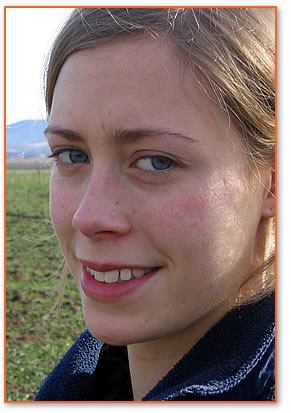Meisha Holloway-Phillips 
What inspired you to do science?
I’m not sure where it all began…or how I even got to where I am now…but like all inquisitive kids, the question of “why” and the pursuit to find the answer (often leading to injuries of annoying brothers, or weird and wonderful concoctions in the kitchen), may have had something to do with it!
I’ve always been interested in understanding why things happen, or why things are the way they are. So science seemed the natural avenue to discover the answers I was looking for. I studied science throughout high school and college, and had very inspiring teachers, which helped stimulate my interest. Science was fun! And I enjoyed the challenge and satisfaction it gave me when I finally understood what was going on. But I couldn’t really picture myself being a scientist for the rest of life. I was looking for a career that would allow me to diversify easily, that had a mixture of indoor and outdoor activities, involved people and making a difference in their everyday-lives. At that stage, becoming a scientist spelt white lab coat, microscope, test-tubes and a nerdy, lab constrained lifestyle! So I stuck with Plan A: to become an architect and design and manage my own restaurant come jazz bar!
How did you become an agricultural scientist?
One day, almost by accident, I found out that the Agricultural Department was holding an information session in the library during lunch. Being curious as I was, I decided to discover what it was all about. It was eye-opening! I’d never really considered how important science is to our primary industries and in turn how important agriculture is to people’s livelihoods and Tasmania’s economy. More to the point, I always thought agricultural science was about becoming a farmer, and coming from a city-slicker background, I didn’t think it would really suit my lifestyle, especially considering I hated getting my hands dirty (things have changed a bit)! As I found out, ag science offered careers not just in farm management, but consultancy, research, teaching and policy-making. So from that day I signed up for the Industry Placement Program, which included a 5-day camp travelling around Tasmania looking at the major industries and a weeks work experience. This I did at the Tasmanian Institute of Agricultural Research’s Newtown laboratories, looking at the anatomy of wine grapes, inspecting apples for codling moth and learning about biological measures for controlling weeds such as gorse and ragwort. It was a major deciding point for me…and as a result I enrolled in a degree in Agricultural Science at the University of Tasmania.
What are you doing now?
Last year I graduated from my degree with first class honours, which was very exciting! But it only wetted my appetite for more research! So I’ve come back to do a PhD. This involves a 3-year project looking at ways to improve the efficiency of water use in the dairy industry. I’m specifically looking at an alternative management practice called deficit irrigation, where you apply less water than the crop requires. To use this practice we need to firstly know how the pasture plant, perennial ryegrass responds to different levels of water, and then we can recommend to farmers optimal levels to irrigate to that save water but don’t significantly effect pasture yields.
It’s an exciting area to be working in as water scarcity is a big issue both globally and in Australia. For example, in the next two decades, 1.8 billion people are expected to be living in countries or regions with absolute water scarcity (water availability below 500 m3), and two-thirds of the world population could by under conditions of water stress (between 500-1000 m3). So coming up with solutions to decrease our water consumption, whilst still producing the same amount of food, is of high priority.
What does the future hold?
Well, last year I said that I was considering a career in systems modelling, viticulture or the dairy industry! At the moment, conducting research for the dairy industry is where I’ve ended up…but beyond a PhD, the opportunities are endless and very diverse, which is what makes ag. science so exciting. So who knows!
What I am looking forward to though is getting out and working in the industry – meeting new people, learning how each production system works, and coming up with solutions to limitations and problems, using science as the tool to discover the answers. One of my aims is to be able to extend science knowledge to the practical farm situation, and in the process assist farmers to improve productivity and profits to the benefit of their livelihood and the Australian economy, along with environmental sustainability.




